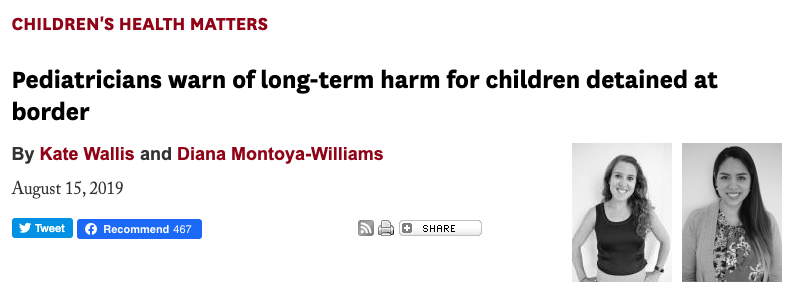Immigration Policies Qualify as Torture, Our Research Should Not Re-Traumatize

Last August, we wrote about the severe risks to children’s mental and physical health from ongoing policies that call for separating children from their families and detaining them as they claim asylum at our borders. Many physicians in both the lay media and the scientific community echoed similar warnings.
These policies and their impact on families have cycled in and out of the national discourse throughout the last year and they continue to be hot topics during this presidential election season. Late last month, the Nobel Peace Prize-winning organization Physicians for Human Rights (PHR) published a report based on evaluations of asylum-seeking parents and children separated by the U.S. government in 2018. The first of its kind, the report describes that almost every adult and child interviewed exhibited symptoms of trauma and its effects and that most individuals met diagnostic criteria for at least one mental health condition, such as post-traumatic stress disorder, major depressive disorder or generalized anxiety disorder. This report reinforces our concerns and concludes that these government policies separating families meet the United Nations’ definition of torture due to their cruel, inhuman and degrading treatment of asylum seekers.
As policy-focused researchers, we are hopeful that these data will arm researchers and stakeholders with the tools they need to work together and quickly replace these harmful immigration policies with health-affirming, equitable ones. As pediatricians, however, we offer a new word of caution. Immigration policies that impact health should be evidence-based, yes. But as we seek to gather data on the impact of new or existing policies, we should remember that information gathering from victims can be re-traumatizing. Being asked to provide details about a traumatic experience can cause an individual to re-live that experience, especially if the interviewer is not trained in trauma-informed methods. PHR investigators’ approach was notably considerate in that they utilized data gathered through necessary legal forensic evaluations rather than through separate interviews for the sole purpose of research.
While PHR focused on some of the immediate and short-term impacts of family separation policies, we remain concerned, as we wrote in August, about the potential long-term effects of these practices. Unfortunately, we expect that evidence of those late outcomes will continue to accrue. It will be important to monitor these children and families for the long-term effects of trauma and to recognize their responses to trauma-informed therapy. If we conduct this data-gathering through the course of clinical care and by reviewing legal documentation related to families’ asylum claims, we can gather evidence without causing re-traumatization.
All of us who work to shed light on the damaging impact of current immigration policies and potential policy alternatives must consider such thoughtful approaches. Given that many of our immigrant patient families report having experienced discrimination and trauma in the current policy environment, we must be cognizant both as health care providers and as researchers about our roles in mitigating the effects of those experiences.

